|
|
St Paul the Confessor, Patriarch of Constantinople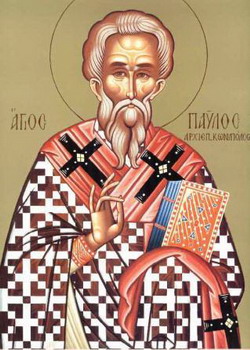 When the blessed Patriarch Alexander was lying on his deathbed, the lamenting faithful asked him whom he would leave to follow him as chief pastor of the flock of Christ. Then the sick Patriarch said to them: 'If you want to have a shepherd who will teach you and whose virtues will illumine you, choose Paul; but, if you want a suitable man as a figurehead, choose Macedonius.' The people chose Paul. This was not acceptable to the Arian heretics, nor to the Emperor Constantius, who was at that time in Antioch, and so Paul was quickly deposed and fled to Rome together with St Athanasius the Great. There, both Pope Julian and the Emperor Constans gave them a warm welcome and upheld them in their Orthodoxy. The Emperor and the Pope sent letters which restored Paul to his episcopal throne, but, after the death of Constans, the Arians raised their heads again and drove the Orthodox Patriarch off to Cucusus in Armenia. While Paul was celebrating the Liturgy one day in exile, he was set on by the Arians and strangled with his pallium. This was in the year 351. In the time of the Emperor Theodosius, in 381, his relics were translated to Constantinople, and, in 1236, to Venice, where they still lie. * His beloved priests and secretaries, Marcian and Martyrius, suffered soon after their Patriarch, on October 25th, 355 (see their lives on that day).
*A small piece of their relics is kept at the Russian Cathedral in London -Tr. When the blessed Patriarch Alexander was lying on his deathbed, the lamenting faithful asked him whom he would leave to follow him as chief pastor of the flock of Christ. Then the sick Patriarch said to them: 'If you want to have a shepherd who will teach you and whose virtues will illumine you, choose Paul; but, if you want a suitable man as a figurehead, choose Macedonius.' The people chose Paul. This was not acceptable to the Arian heretics, nor to the Emperor Constantius, who was at that time in Antioch, and so Paul was quickly deposed and fled to Rome together with St Athanasius the Great. There, both Pope Julian and the Emperor Constans gave them a warm welcome and upheld them in their Orthodoxy. The Emperor and the Pope sent letters which restored Paul to his episcopal throne, but, after the death of Constans, the Arians raised their heads again and drove the Orthodox Patriarch off to Cucusus in Armenia. While Paul was celebrating the Liturgy one day in exile, he was set on by the Arians and strangled with his pallium. This was in the year 351. In the time of the Emperor Theodosius, in 381, his relics were translated to Constantinople, and, in 1236, to Venice, where they still lie. * His beloved priests and secretaries, Marcian and Martyrius, suffered soon after their Patriarch, on October 25th, 355 (see their lives on that day).
*A small piece of their relics is kept at the Russian Cathedral in London -Tr.Our Holy Father Varlaam of Chutinsk, the Wonderworker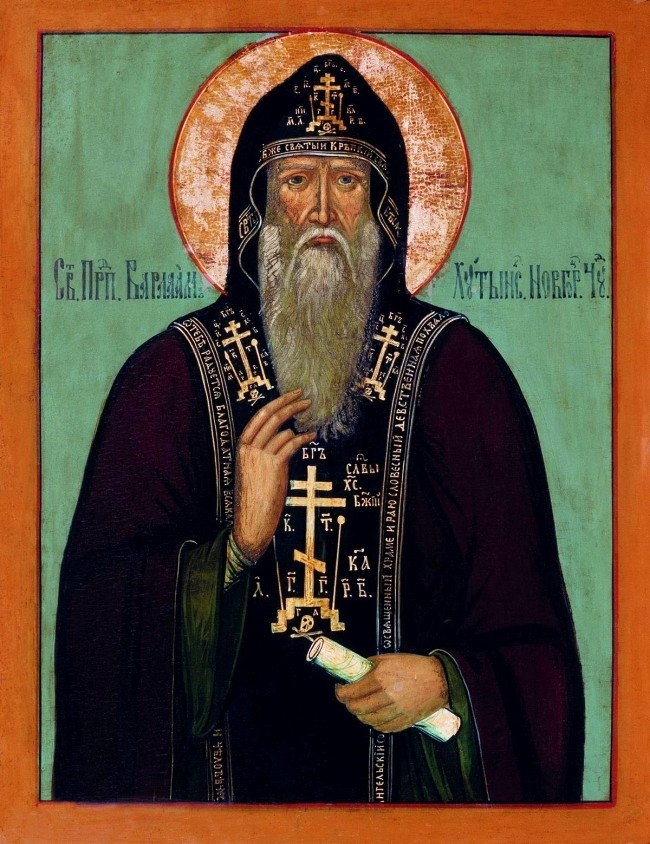 Born and brought up a Christian in Novgorod the Great, he became a monk on the death of his parents and devoted himself to strict asceticism. He founded a monastery on the bank of the Volkhov river, on a site shown to him by a heavenly light. He was a great wonderworker both during his lifetime and after his death, being able to penetrate human secrets, to drive out unclean spirits and to heal all sicknesses. A servant of Prince Vasilii Vasilievitch was taken seriously ill, and he asked to be carried to the grave of St Varlaam, and further asked that, if he should die on the way, they should take his dead body to the saint. And so it came to pass: he died on the road, and they brought him dead into the monastery, where he was restored to life, stood up and prostrated himself before the tomb of the saint. In 1471, Tsar Ivan the Terrible gave orders that the saint's grave be dug up. As soon as they had begun to uncover it, a flame sprang from the grave and blazed along the walls of the church. The Tsar was so terrified that he fled from the church and, in his haste, forgot his staff, which is kept to this day beside the saint's tomb. In commemoration of this wonder, St Varlaam is also remembered on the Friday after the Sunday of All Saints. Born and brought up a Christian in Novgorod the Great, he became a monk on the death of his parents and devoted himself to strict asceticism. He founded a monastery on the bank of the Volkhov river, on a site shown to him by a heavenly light. He was a great wonderworker both during his lifetime and after his death, being able to penetrate human secrets, to drive out unclean spirits and to heal all sicknesses. A servant of Prince Vasilii Vasilievitch was taken seriously ill, and he asked to be carried to the grave of St Varlaam, and further asked that, if he should die on the way, they should take his dead body to the saint. And so it came to pass: he died on the road, and they brought him dead into the monastery, where he was restored to life, stood up and prostrated himself before the tomb of the saint. In 1471, Tsar Ivan the Terrible gave orders that the saint's grave be dug up. As soon as they had begun to uncover it, a flame sprang from the grave and blazed along the walls of the church. The Tsar was so terrified that he fled from the church and, in his haste, forgot his staff, which is kept to this day beside the saint's tomb. In commemoration of this wonder, St Varlaam is also remembered on the Friday after the Sunday of All Saints.Commemoration of the falling of ash from the airThis occurred in Constantinople in 472 (or 475, according to the Greek Synaxarion), during the reign of the Emperor Leo the Great and Patriarch Gennadius.
Venerable Luke, monk, of Sicily (820)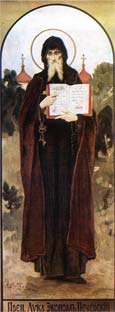 The Monk Luke of Tauromenium was a native of the Sicilian city of Tauromenium. In his youth he left his parents and fiancee and went into the wilderness, where he spent many years in fasting and prayer. He asceticised at Mount Aetna. Towards the end of his life the Monk Luke, through a revelation to him, founded a monastery. In order to become familiar with the ustav/rule and life of other monasteries, the monk visited many other cities. During the time of one of these journeys he died at Corinth at the beginning of the IX Century. The Monk Luke of Tauromenium was a native of the Sicilian city of Tauromenium. In his youth he left his parents and fiancee and went into the wilderness, where he spent many years in fasting and prayer. He asceticised at Mount Aetna. Towards the end of his life the Monk Luke, through a revelation to him, founded a monastery. In order to become familiar with the ustav/rule and life of other monasteries, the monk visited many other cities. During the time of one of these journeys he died at Corinth at the beginning of the IX Century.Repose of St. German, archbishop of Kazan (1567)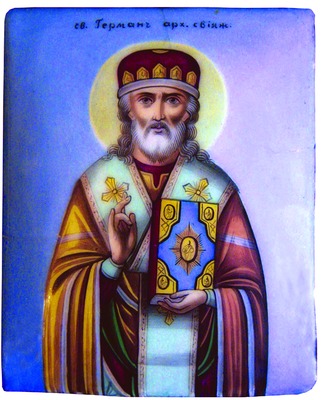 Sainted German, Archbishop of Kazan, lived during the XVI Century. He was born in the city of Staritsa, and was descended from the old boyar-noble line of the Polevi. In his youthful years Grigorii (such was his name in the world) took tonsure at the Josepho-Volokolamsk monastery under the Hegumen Gurii, who afterwards became likewise a Sainted-Archbishop of Kazan (+ 1563, Comm. 5 December). (Saint Gurii was head of the monastery from 1542 to 1551). At the monastery Saint German occupied himself with the copying of books, and he was close with the Monk Maxim the Greek, living there confined. In 1551 the brethren of the Staritsa Uspenie monastery, having learned of the piety of their native-son, chose him as their archimandrite.
Having entered into the guidance of this monastery, Saint German with a pastoral zeal concerned himself over its disposition, both outer and inner, – for the monk himself was a model of humility and meekness. He exhorted all to strictly observe their monastic commitment, and for guidance he introduced into his monastery the ustav/rule of the Monk Joseph of Volotsk (+ 1515, Comm. 18 October).
But after two and an half years Archimandrite German left the Staritsa monastery, having transferred its guidance to the priestmonk Job, who afterwards was to become the first Patriarch of Moscow, and was an ascetic and sufferer for the Russian Land. Saint German's love for solitary efforts brought him to return to his original Volokolamsk monastery, where he strove towards his salvation as a simple monk. When however there appeared at Moscow the new heretic Matfei Bashkin, who refused to acknowledge the Holy Sacraments and denied faith in the Holy Trinity, Saint German together with his own father (who himself had received tonsure at the Volokolamsk monastery with the name Philothei) was called to the Moscow Sobor (Council) of 1553. The Sobor censured the heretic Bashkin and resolved to send him for enlightening to the Volokolamsk monastery to Saint German, as one known for his holy life and zeal for the faith in Christ.
In 1555, after the taking of Kazan, an archbishopal cathedra-seat was established there, upon which they designated as archbishop the former hegumen of Volokolamsk monastery, Saint Gurii. To him was entrusted to build for missionary purposes an Uspenie monastery in the city of Sviyazhsk. By decree of Saint Gurii, the designated head of this new monastery of the Uspenie-Dormition of the MostHoly Mother of God in Sviyazhsk was Saint German. A stone cathedral with bell-tower and monastic cells was built. And the monastery head himself lived very frugally, in a cramped cell beneathe the cathedral bell-tower. And Saint German concerned himself particularly over the gathering together of a monastery library.
Soon his monastery became far-famed for its doing of good, and it became a centre of enlightenment for the Kazan region.
On 12 March 1564, after the repose of Saint Gurii, Saint German was consecrated bishop of Kazan. The short duration of his cathedral guidance was marked nonetheless by concern over the building of churches and the enlightenment of the region. In 1566 Ivan the Terrible summoned Saint German to Moscow and gave orders to elect him to the Metropolitan cathedra-seat there. Saint German at first refused to have this burden imposed upon him. The tsar would not tolerate any objection and the saint was obliged to settle into the Metropolitan quarters until his elevation to the dignity of Metropolitan. And seeing the injustices on the part of the tsar's inner circle, Saint German, true to his pastoral duty, attempted to reason with the tsar by his admonitions. – "Thou art not yet elevated to Metropolitan, and already thou placest constraints upon my freedom", – communicated the tsar through his cronies and gave orders to expel Saint German from the Metropolitan quarters and hold him under surveillance. The saint survived for about two years in disgrace and on 6 November 1567 he died. They interred him in the church of Saint Nicholas the Hospitable. And later, at the request of the inhabitants of Sviyazhsk, the relics of the saint in 1592 were transferred from Moscow to the Sviyazhsk Uspenie monastery. Saint Ermogen, then Metropolitan of Kazan, paid visit to his grave. Sainted German, Archbishop of Kazan, lived during the XVI Century. He was born in the city of Staritsa, and was descended from the old boyar-noble line of the Polevi. In his youthful years Grigorii (such was his name in the world) took tonsure at the Josepho-Volokolamsk monastery under the Hegumen Gurii, who afterwards became likewise a Sainted-Archbishop of Kazan (+ 1563, Comm. 5 December). (Saint Gurii was head of the monastery from 1542 to 1551). At the monastery Saint German occupied himself with the copying of books, and he was close with the Monk Maxim the Greek, living there confined. In 1551 the brethren of the Staritsa Uspenie monastery, having learned of the piety of their native-son, chose him as their archimandrite.
Having entered into the guidance of this monastery, Saint German with a pastoral zeal concerned himself over its disposition, both outer and inner, – for the monk himself was a model of humility and meekness. He exhorted all to strictly observe their monastic commitment, and for guidance he introduced into his monastery the ustav/rule of the Monk Joseph of Volotsk (+ 1515, Comm. 18 October).
But after two and an half years Archimandrite German left the Staritsa monastery, having transferred its guidance to the priestmonk Job, who afterwards was to become the first Patriarch of Moscow, and was an ascetic and sufferer for the Russian Land. Saint German's love for solitary efforts brought him to return to his original Volokolamsk monastery, where he strove towards his salvation as a simple monk. When however there appeared at Moscow the new heretic Matfei Bashkin, who refused to acknowledge the Holy Sacraments and denied faith in the Holy Trinity, Saint German together with his own father (who himself had received tonsure at the Volokolamsk monastery with the name Philothei) was called to the Moscow Sobor (Council) of 1553. The Sobor censured the heretic Bashkin and resolved to send him for enlightening to the Volokolamsk monastery to Saint German, as one known for his holy life and zeal for the faith in Christ.
In 1555, after the taking of Kazan, an archbishopal cathedra-seat was established there, upon which they designated as archbishop the former hegumen of Volokolamsk monastery, Saint Gurii. To him was entrusted to build for missionary purposes an Uspenie monastery in the city of Sviyazhsk. By decree of Saint Gurii, the designated head of this new monastery of the Uspenie-Dormition of the MostHoly Mother of God in Sviyazhsk was Saint German. A stone cathedral with bell-tower and monastic cells was built. And the monastery head himself lived very frugally, in a cramped cell beneathe the cathedral bell-tower. And Saint German concerned himself particularly over the gathering together of a monastery library.
Soon his monastery became far-famed for its doing of good, and it became a centre of enlightenment for the Kazan region.
On 12 March 1564, after the repose of Saint Gurii, Saint German was consecrated bishop of Kazan. The short duration of his cathedral guidance was marked nonetheless by concern over the building of churches and the enlightenment of the region. In 1566 Ivan the Terrible summoned Saint German to Moscow and gave orders to elect him to the Metropolitan cathedra-seat there. Saint German at first refused to have this burden imposed upon him. The tsar would not tolerate any objection and the saint was obliged to settle into the Metropolitan quarters until his elevation to the dignity of Metropolitan. And seeing the injustices on the part of the tsar's inner circle, Saint German, true to his pastoral duty, attempted to reason with the tsar by his admonitions. – "Thou art not yet elevated to Metropolitan, and already thou placest constraints upon my freedom", – communicated the tsar through his cronies and gave orders to expel Saint German from the Metropolitan quarters and hold him under surveillance. The saint survived for about two years in disgrace and on 6 November 1567 he died. They interred him in the church of Saint Nicholas the Hospitable. And later, at the request of the inhabitants of Sviyazhsk, the relics of the saint in 1592 were transferred from Moscow to the Sviyazhsk Uspenie monastery. Saint Ermogen, then Metropolitan of Kazan, paid visit to his grave.Venerable Luke, steward of the Kiev Caves (13th c.)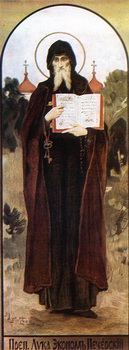 The time of his asceticism is not known with precision. His incorrupt relics repose in the St. Anthony Cave. The time of his asceticism is not known with precision. His incorrupt relics repose in the St. Anthony Cave.St. Demetrianus, bishop of Cytheria in Cyprus (915)
|